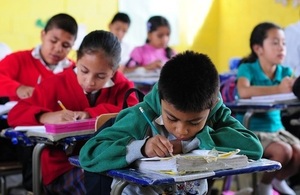DFID Research: What works in education in developing countries
A new report shows that education interventions not only get children into school but help them learn more.

Picture: Maria Fleischmann / World Bank
A new publication reviewing evidence of what works in education in developing countries, shows that education interventions are working. These interventions are not only getting more children into school and keeping them there but are also helping children to learn more.
The report was published by the International Initiative for Impact Evaluation (3ie), a grant-making agency for evidence-based research. It is the first systematic investigation into schooling outcomes and examines evidence from 75 studies across a range of school interventions.
The report, Quality education for all children? What works in education in developing countries, looks at a range of school interventions. It provides compelling evidence of the effectiveness of conditional cash transfers on school enrolment and attendance. For example, health interventions had a positive effect on attendance. Further more, the provisions of new materials, such as computer-aided learning tools, and better school buildings significantly improved mathematics, reading and writing test scores.
The report highlights a number of significant findings:
-
conditional cash transfers increase school enrolment and attendance, but have no overall impact on children’s test scores (though the evidence base is not that broad for learning outcomes)
-
school fees subsidies improve enrolment and progress in school, while merit-based scholarships increase learning
-
distributing teaching and learning aids in school has no impact on school attendance and language test scores of children. However, computer-based learning offered in addition to the regular school curriculum has positive impacts on mathematics test scores
-
investing in additional teachers, new schools, early childhood development programmes, community-based school management and school-feeding programmes looks promising in boosting schooling outcomes
However, not all interventions had significant results, though this may be due to the limited number of studies. And while several interventions, such as teacher resources, new school buildings, early childhood development and school-feeding programmes, had positive effects on schooling outcomes, more studies are needed to confirm these findings.
Evidence Matters, a policy brief produced in collaboration with the IDS Knowledge Services, draws out policy recommendations from the report and provides direction for programme design and implementation.
Read the report: Quality education for all children? What works in education in developing countries.
Read more about the policy brief.
3ie funds impact evaluations and systematic reviews into development effectiveness and is supported by the UK Department for International Development.